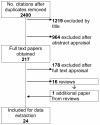Health in the 'hidden population' of people with low literacy. A systematic review of the literature
- PMID: 20687946
- PMCID: PMC2923110
- DOI: 10.1186/1471-2458-10-459
Health in the 'hidden population' of people with low literacy. A systematic review of the literature
Abstract
Background: Much of the evidence of an association between low functional or health literacy and poor health comes from studies that include people who have various cognitive difficulties or who do not speak the dominant language of their society. Low functional or health literacy among these people is likely to be evident in spoken conversation. However, many other people can talk readily about health and other issues but have problems using written information. Consequently, their difficulties may be far less evident to healthcare professionals, creating a 'hidden population' whose functional or health literacy problems have different implications because they are less likely to be recognised and addressed.We aimed to review published research to investigate relationships between low functional or health literacy and health in working age adults who can converse in the dominant language but have difficulty with written language.
Methods: We searched reviews and electronic databases for studies that examined health-related outcomes among the population of interest. We systematically extracted data relating to relationships between low functional or health literacy and both health status and various possible mediators or moderators of the implications of literacy for health. We developed a narrative review.
Results: Twenty-four studies met our inclusion criteria. Lower functional or health literacy in this population was found to be associated with worse health status. This may be mediated by difficulties accessing healthcare, and poorer self-management of health problems. It is currently unclear whether, how or to what extent these difficulties are mediated by poorer knowledge stemming from low functional or health literacy. The variation in functional or health literacy measures and comparisons make it difficult to compare study findings and to establish the implications of different literacy issues for health outcomes.
Conclusions: There is evidence in the literature that low functional or health literacy is associated with poor health in the 'hidden population' of adults whose literacy difficulties may not be evident to health care providers. Further research is needed to help understand the particular disadvantages faced by this population and to establish appropriate responses.
References
-
- Moser CS. Improving literacy and numeracy: a fresh start. London: DfEE Publications; 1999.
-
- World Health Organisation (WHO) Division of Health Promotion, Education and Communications, Health Education and Health Promotion Unit. Health Promotion Glossary. Geneva: World Health Organisation; 1998.
Publication types
MeSH terms
Grants and funding
LinkOut - more resources
Full Text Sources
Medical
Miscellaneous


